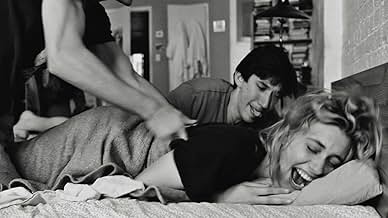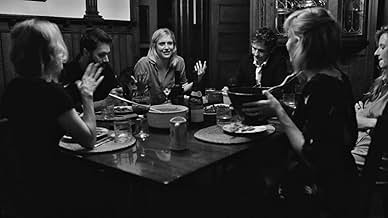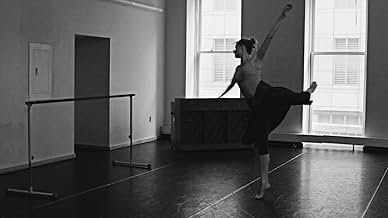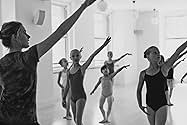Frances Ha
- 2012
- Tous publics
- 1h 26m
A New York woman apprentices for a dance company and throws herself headlong into her dreams, even as the possibility of realizing them dwindles.A New York woman apprentices for a dance company and throws herself headlong into her dreams, even as the possibility of realizing them dwindles.A New York woman apprentices for a dance company and throws herself headlong into her dreams, even as the possibility of realizing them dwindles.
- Awards
- 1 win & 49 nominations total
- Director
- Writers
- All cast & crew
- Production, box office & more at IMDbPro
Featured reviews
Shot in black and white by cinematographer Sam Levy, 27-year-old Frances lives in a Brooklyn apartment with her girl friend Sophie (Mickey Sumner). She wants to be a dancer, and apprentices for a small dance company, but seems to lack the determination to really develop her talent. Though the exact nature of their relationship is not spelled out (what you see is what you get), they are at the very least good buddies who are tight. Frances says her relationship with Sophie is "like a lesbian couple that doesn't have sex anymore," but Sophie is not quite as attached and tells Frances that she has decided to move in with her upscale boyfriend Patch (Patrick Heusinger).
Refreshingly however, the story is not about relationships being the necessary ingredient of a woman's self-esteem, but simply one component of an internal growth process. Frances goes out with Lev (Adam Driver), another under-achieving New Yorker, but her economic needs trump her physical ones and she moves in with Lev and his roommate Benji (Michael Zegen) on a strictly platonic basis to save on the rent, although Benji develops a real connection with her (which Frances is blind to). She stumbles through relationships, not making a terrific impression. One woman tells her in talking about her friend, "You look a lot older, but you seem far less mature." Frances does not have the kind of job prospects that she alludes to with her friends and her overall veracity is questionable, but she makes up for it with tons of charm. She actually makes some stabs at shaking things up, going home to Sacramento to visit her parents (Gordon and Christine Gerwig, her real parents), impulsively flying to Paris for a weekend to prove to a friend that she can, and, upon returning after a joyless weekend, taking a job as a "drink pourer" at Vassar where she had gone to school. Unfortunately, the more things change, the more they stay the same.
Although Frances Ha is about young New Yorkers living on the margins, it is not and does not aspire to be a commentary on the current economic situation or the plight of young people. The film is about talented folks who have not quite gotten it together and whose level of responsibility lags somewhere below the norm. The characters have their flaws and are not always self aware, but Baumbach recognizes that the process of growth does not happen suddenly and refuses to judge his characters, or make snide commentaries about New Yorkers.
Frances Ha does not rely on formula or relationship clichés to make its points, but only on the performances to bring the characters to life. Baumbach and Gerwig take us on a wild ride without any clear signposts, yet the trip is poignant and even beautiful and we can joyously sense the light around the next turn. Unlike the angry, unpleasant Roger in Baumbach's previous film Greenberg, the more you hang around Frances (Greta Gerwig), the more you grow to like her insanely. Though Frances may be undateable, the film is unmissable.
I liked this film in a kind of interested, warm way as it got going. Its black and white simplicity and its regular people both appeal on the most normal level.
The more I watched, however, and the more I absorbed the brilliance of the performance by leading actress playing Frances (Greta Gerwig), I became entranced and stunned. This is a great film. A great independent film, without production pretensions, but held together perfectly within its means.
This is worth making clear—the film makes a virtue of its simple approach. You'll never feel like it's technically compromised. The photography is a subtle, smart black and white. There's even one scene near the end where two people are talking in bed and they chose to use the very minimum of light, so you just barely see their faces. For a long deep conversation. Gorgeous, and effective.
It's Gerwig who steals the movie, for sure. And she helped write the really sparkling, believable, clever but never too-clever script. It's brilliant stuff. Brilliant. She hits a note of fast transparency, a totally "right" dialog and delivery. Way harder than it seems.
And the character she plays, Frances, is one of those lovable types where things don't go quite right even with all the best intentions. Most of us identify with that all too well. We have our better selves and we have the reality of where those good intentions have gotten us. And yet she perseveres. She puts up with strange but not unfriendly people around her in one apartment after another, and we get a glimpse of young New Yorkers with all their minor pretensions. Searing and funny and touching.
Don't be put off by the weird title (the one mistake in making the film) or by the beginning and its slow, restrained monochrome. The film makes the most of it all and is terrific.
The film stars the zealous Greta Gerwig (whose work in Hannah Takes the Stairs I still regard as terrific) as the title character, a plucky dancer at the age of twenty-seven, living with her best friend Sophie (Mickey Summer) and her best guy-friend Benji (Michael Zegen). Frances and her friend Sophie are like "straight lesbians," so Benji says, as they do everything together, and both of them would seemingly be lost without each other. The thought is put to the test when Sophie decides to move out of the cramped studio apartment in favor of moving in with another friend, leaving Frances sort of lost and unfulfilled with her current position in life.
This is basic framework for a story that begins to follow the path of a series of vignettes, focusing on the ups and downs in life, along with those awkward stretches no one really likes to talk about. Baumbach brilliantly captures this through a black and white lens, and allows his actors the freedom to get immersed in their characters with little restrictions in place.
Frances Ha does a lot in eighty-six minutes, like notably humanizing the "hipster" culture of the last few years, detail loneliness and friendships, impending adulthood, and dependence all the more. The humanization of "hipster" culture comes into play because we notice that these characters are not of the "typical" breed, whatever we define as typical. They are about as free and unrestrained as the wind that catches their hair, especially Frances herself, who is arguably one of the most fun characters I've had the pleasure of watching this year. There's something about the way she engages in quick-witted conversation, runs happily through the streets of Chinatown at random, and is constantly proclaiming she is "undateable.' Gerwig magically transforms a character bound for a caricature state of mind into a strong woman that may not be looked at as a role model for girls but certainly a realistic portrayal of many.
I imagine the loneliness that the loneliness and slight-depression Frances feels when Sophie leaves her is one many post-college girls will feel when their best girlfriend moves on to bigger and better things and she remains somewhat inert and stuck in her current life position. Baumbach details growing up in Frances Ha not as a choice but as an obligation, which it rightfully is in many regards, but the way he doesn't isn't condescending or superficial, but rather hopeful and endearing.
NOTE: My video review of Frances Ha, http://www.youtube.com/watch?v=yc6LbMzbGww
Starring: Greta Gerwig, Mickey Summer, and Michael Zegen. Directed by: Noah Baumbach.
Did you know
- TriviaFrances' parents are played by Greta Gerwig's real-life parents, Gordon Gerwig and Christine Gerwig.
- GoofsAt 59:23, Sophie's voice says the words faster than her mouth moves. Particularly near the end of her sentences.
- Quotes
Frances: It's that thing when you're with someone, and you love them and they know it, and they love you and you know it... but it's a party... and you're both talking to other people, and you're laughing and shining... and you look across the room and catch each other's eyes... but - but not because you're possessive, or it's precisely sexual... but because... that is your person in this life. And it's funny and sad, but only because this life will end, and it's this secret world that exists right there in public, unnoticed, that no one else knows about. It's sort of like how they say that other dimensions exist all around us, but we don't have the ability to perceive them. That's - That's what I want out of a relationship. Or just life, I guess.
- ConnectionsFeatured in Maltin on Movies: The Hangover Part III (2013)
- SoundtracksThème de Camille
Written and Performed by Georges Delerue
Courtesy of Igloo Music/Marouani Music/EMI Music Publishing
- How long is Frances Ha?Powered by Alexa
Details
- Release date
- Countries of origin
- Official sites
- Languages
- Also known as
- Френсіс Ха
- Filming locations
- Production companies
- See more company credits at IMDbPro
Box office
- Gross US & Canada
- $4,069,826
- Opening weekend US & Canada
- $137,398
- May 19, 2013
- Gross worldwide
- $8,975,688
- Runtime1 hour 26 minutes
- Color
- Sound mix
- Aspect ratio
- 1.85 : 1
Contribute to this page





































